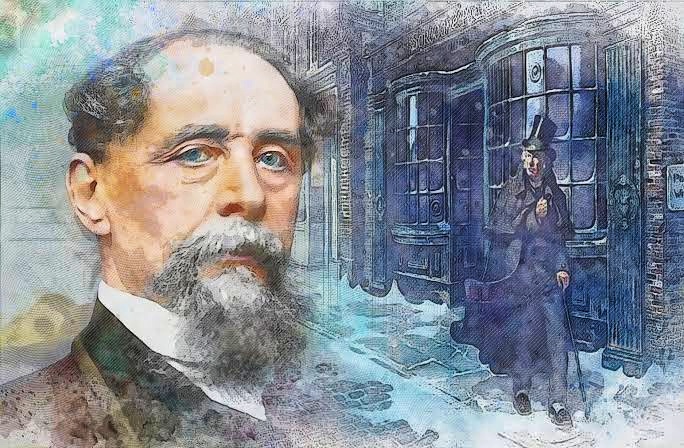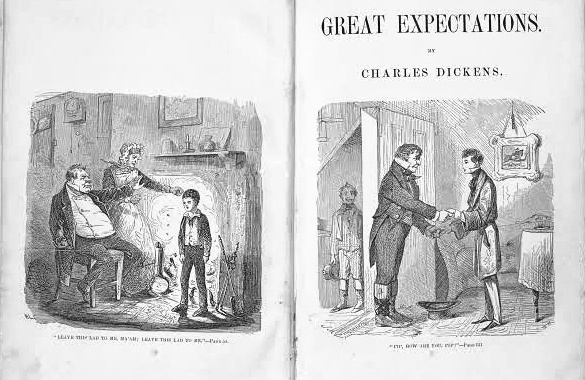Analyse the character of Pip in Charles Dickens’ Great Expectations.

Character of Pip
Pip is the protagonist and narrator of Charles Dickens‘ novel “Great Expectations”. He is an orphan boy who grows up in poverty and obscurity in a small village in England. His encounter with a mysterious benefactor changes his life, and he embarks on a journey of self-discovery that leads him to the realization of his dreams and the fulfillment of his expectations. Pip’s character is complex and dynamic, and his journey is marked by a series of challenges and obstacles that shape his personality and worldview.
At the beginning of the novel, Pip is a young boy living in poverty in a rural village in England. He is an orphan, raised by his abusive older sister and her husband, Joe, a kind-hearted blacksmith. Pip’s life changes when he encounters an escaped convict who threatens him into stealing food and a file from Joe’s workshop. This encounter sets Pip on a path of guilt, shame, and ambition, as he becomes obsessed with the idea of becoming a gentleman and leaving his humble origins behind.
Pip’s desire for social mobility and acceptance is one of the defining features of his character. He is ashamed of his low social status and sees himself as inferior to those of higher rank. As literary critic Harold Bloom notes, “Pip is both drawn to and repelled by the world of the aristocracy. He wants to escape his own life, but he is also afraid of losing his sense of identity” (Bloom 48). This fear of losing his identity is evident in Pip’s relationships with the novel’s other characters. He is often manipulative and deceitful, using people to advance his own interests and ignoring those who do not fit into his vision of himself as a gentleman.
However, as the novel progresses, we begin to see a more complex and sympathetic side of Pip. His relationship with Joe, in particular, highlights his capacity for love and loyalty. Despite his ambition, Pip feels a deep connection to Joe and is torn between his desire to leave him behind and his guilt at abandoning him. This conflict is evident in a scene where Pip is ashamed of Joe’s lack of refinement, but later regrets his behavior and acknowledges Joe’s goodness:
“I was ashamed of him [Joe], ashamed of my home, ashamed of my upbringing…Yet, I knew him not to be an educated man, I thought him to be quite an uneducated man. I had learned a great deal since I had lived with him…I was not the last boy in the school. Far from it. But I had learnt a great deal from Joe, that Joe had never learnt from me or from anyone” (Chapter 27).
This realization is a turning point in Pip’s character development, as he begins to understand that social class and education do not necessarily equate to moral superiority.
Pip’s relationships with other characters also shed light on his personality. His infatuation with Estella, for example, is a reflection of his desire for social acceptance and his belief that wealth and refinement are the key to happiness. However, as literary critic Lionel Trilling notes, “Pip’s affection for Estella…does not rest on any genuine insight into her nature, but rather on the fact that she is a creature of wealth and distinction” (Trilling 56). This lack of self-awareness and his tendency to romanticize people and situations leads to disappointment and disillusionment.
As the novel progresses, Pip experiences a series of setbacks and tragedies that force him to confront his own flaws and limitations. He loses his fortune, his health, and his relationships with those he loves. However, these experiences also lead to a greater sense of self-awareness and moral redemption. Pip realizes the folly of his ambition and acknowledges the importance of humility and compassion. He becomes aware of the harm he has caused to others and seeks to make amends.
Pip’s relationship with Joe Gargery, his brother-in-law and father figure, is one of the most important in the novel. Joe represents a simple, honest, and kind-hearted way of life that Pip initially rejects in favor of his desire for social advancement. However, as Pip’s fortunes decline, he comes to realize the value of Joe’s friendship and the importance of familial bonds. As critic A.D. Nuttall notes, “Joe is the one person in the novel who remains true to himself, and whose moral worth is beyond question” (Nuttall 93). Pip’s relationship with Joe thus represents his journey towards moral redemption and his recognition of the importance of inner goodness over external status.
Another significant relationship in the novel is Pip’s friendship with Herbert Pocket, a fellow clerk who becomes one of his closest confidants. Herbert represents a more grounded and practical way of life than Pip’s romantic and idealistic aspirations. He also serves as a sounding board for Pip’s ideas and a voice of reason when he becomes too caught up in his own ambitions. As critic Harold Bloom notes, “Herbert is the one person in the novel who can penetrate Pip’s delusions and fantasies” (Bloom 66). Pip’s friendship with Herbert thus represents a more balanced and realistic approach to life.
In conclusion, Pip is a complex and multifaceted character whose journey towards self-awareness and moral redemption forms the heart of Great Expectations. Through his relationships with other characters, his experiences of loss and tragedy, and his own inner struggles, Pip learns the importance of humility, compassion, and inner goodness. He represents a modern tragic hero, whose downfall is not brought about by fate or divine intervention, but rather by his own flaws and limitations. As critic Harold Bloom notes, “Pip’s story is a tragedy, not in the traditional sense, but in the modern sense of an individual’s struggle against the constraints of society and the self” (Bloom 72).
*****
Character of Pip (Sample 2)
Pip is the protagonist and narrator of Charles Dickens’ novel “Great Expectations”. He is an orphan boy who grows up in poverty and obscurity in a small village in England. His encounter with a mysterious benefactor changes his life, and he embarks on a journey of self-discovery that leads him to the realization of his dreams and the fulfillment of his expectations. Pip’s character is complex and dynamic, and his journey is marked by a series of challenges and obstacles that shape his personality and worldview.
At the beginning of the novel, Pip is a naive and innocent child who is fascinated by the world around him. He is curious, imaginative, and sensitive, and he has a strong sense of justice and morality. He is deeply affected by the cruelty and injustice he witnesses in his surroundings, and he longs for a better life. However, his aspirations are limited by his social status and his lack of education, and he feels trapped in his humble origins. His encounter with Estella and Miss Havisham changes his perspective and ignites his desire for social advancement.
As Pip grows up, he becomes increasingly aware of the harsh realities of the world. He experiences the pain of rejection and the bitterness of disappointment, and he struggles to reconcile his dreams with the limitations of his circumstances. He is torn between his loyalty to his past and his desire for a brighter future, and he is haunted by the guilt and shame of his actions. His relationship with Joe, his surrogate father, becomes strained, as he feels that Joe represents his past and his humble origins, while he yearns for a more sophisticated and refined existence.
Pip’s journey of self-discovery is marked by a series of transformative experiences. He encounters a cast of colorful characters who challenge his assumptions and broaden his horizons. His relationship with Estella, in particular, is significant, as she becomes the object of his desire and the embodiment of his social aspirations. However, their relationship is marked by tension and conflict, as Estella represents the unattainable ideal that he can never fully possess. The realization of this fact forces Pip to confront the limitations of his expectations and the true nature of his desires.
Throughout the novel, Pip is portrayed as a flawed and imperfect character who struggles with his sense of identity and his place in the world. He is capable of both great kindness and great cruelty, and he is often driven by his own self-interest and ambition. However, his experiences also teach him the value of humility, compassion, and self-awareness. By the end of the novel, Pip has matured into a more reflective and introspective individual who has learned the importance of self-acceptance and forgiveness. He recognizes the importance of his past and his roots, and he understands that his identity is shaped not by his social status, but by his actions and his relationships with others.
In conclusion, Pip is a complex and dynamic character who embodies the novel’s themes of identity, social class, and the pursuit of happiness. His journey of self-discovery is marked by a series of challenges and obstacles that shape his personality and worldview. He is a flawed and imperfect character, but his experiences also teach him the value of humility, compassion, and self-awareness. His character is a testament to the transformative power of self-reflection and personal growth, and his story continues to resonate with readers of all ages and backgrounds.
*****
Read More: Great Expectations by Charles Dickens

